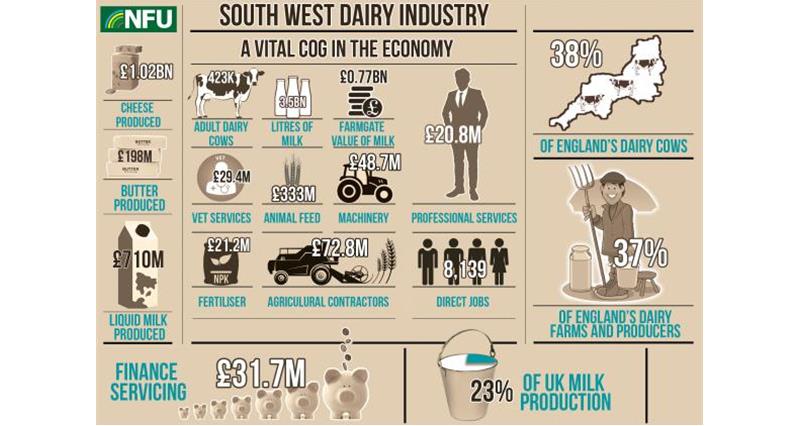Dairy farming is a ‘vital cog’ at the heart of the region’s economy, worth £3.3bn annually and supporting just over 13,600 jobs both directly and through the wider supply chain, according to a new study commissioned by the South West NFU.
The report, produced by the Rural Business School at Duchy College and published on the eve of this year’s South West Dairy Show, highlights the importance of the sector to many other industries. There will be around 300 trade exhibitors at show, supplying everything from milking parlour equipment to tractors to farm advice, all of whom rely on a profitable dairy sector to prosper.
So as Brexit negotiations get underway it is not only the region’s 2,636 dairy farm businesses that will be looking to secure a positive trading environment and a successful future.
According to the report, every year the region produces more than three billion litres of milk (just under a quarter of the UK’s total milk production), which is worth almost £0.72bn to the region’s economy in farm gate milk sales alone.
This milk is used to make 99,170 tonnes of cheese, worth in the region of £628m, and 37,365 tonnes of butter, worth about £198m. Retail sales of liquid milk are worth £710m.
8,139 people are directly employed in dairy farming with an estimated 5,380 working for local processing businesses, including well-known names like Quickes Cheddar, Lye Cross, Dairy Crest and Trewithen Dairy, and in allied trades such as the feed industry, which is worth £330m a year, equipment suppliers, worth around £49m annually, or as veterinary surgeons – dairy farmers spend £29.4m a year on vets bills.
The report also illustrates the pressure dairying has found itself under. The number of producers has fallen by just over half over the last 14 years, from 5,157 in 2002 to 2,885 in 2016. The number of dairy cattle has also steadily declined in recent years from 465,775 in 2005 to 423,205 in 2013. This figure is less than the decrease in the UK overall, indicating that farmers are increasing herd sizes in response to market conditions.
Researchers say this is further evidence that although the industry is in decline, the South West is one of the more robust dairy areas.
Andrew Branton, chairman of the NFU’s South West dairy board said: “We commissioned this piece of work to take a snapshot of the sector and show the enormous value in the supply chain and beyond that dairy farmers deliver for the economy.
“It also highlights some of the challenges which currently face the industry. The presence of dairy farmers must not be taken for granted and they need to have a profitable future if we want to continue to see them generate millions of pounds for the economy. Aside from the economic aspect, we mustn’t forget how much farmers contribute to the environment and tourism, by maintaining the countryside, and how they help sustain local communities.”
“This underlines how important it is that the Government, Local Economic Partnerships, banks and other funding and infrastructure bodies continue to support the agricultural industry as we move towards Brexit.”
